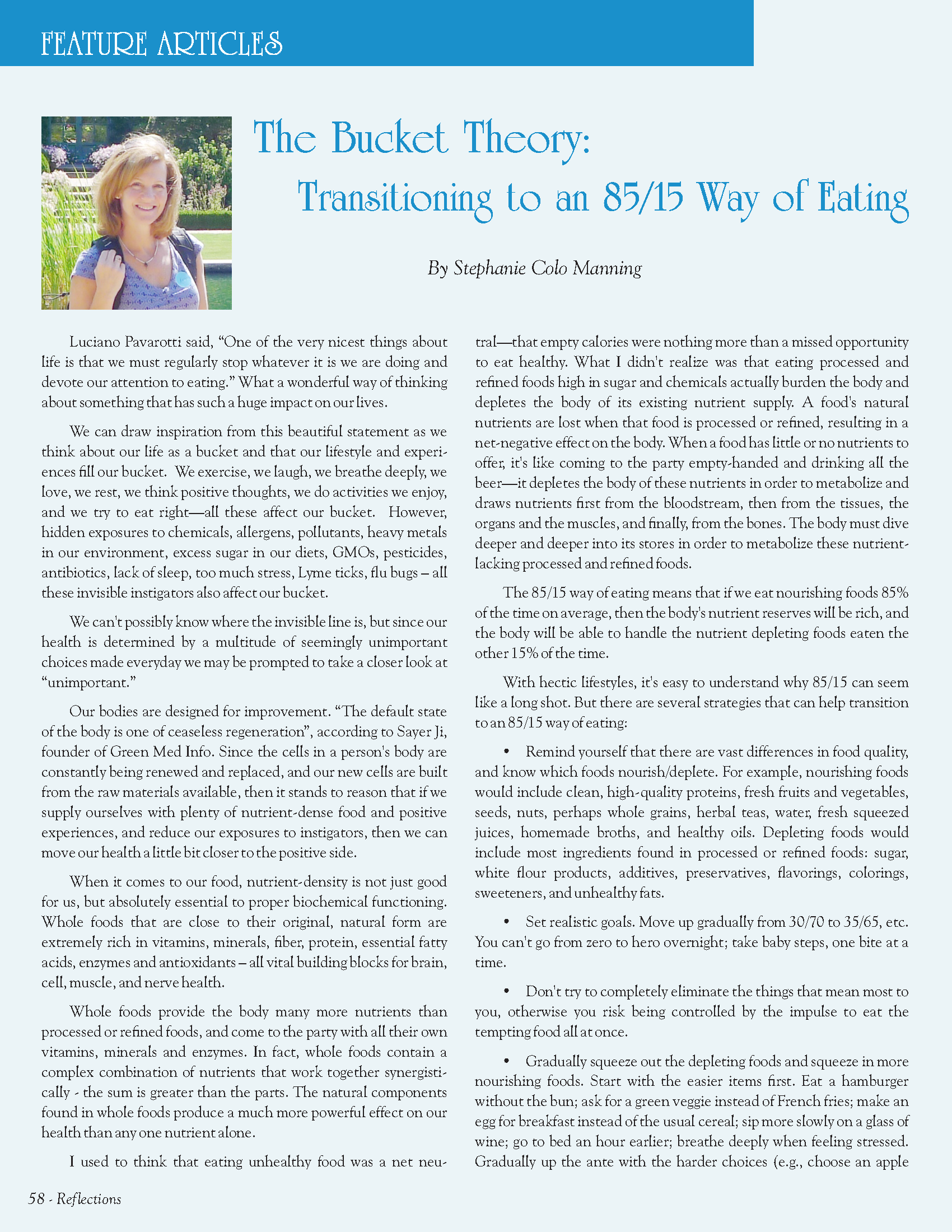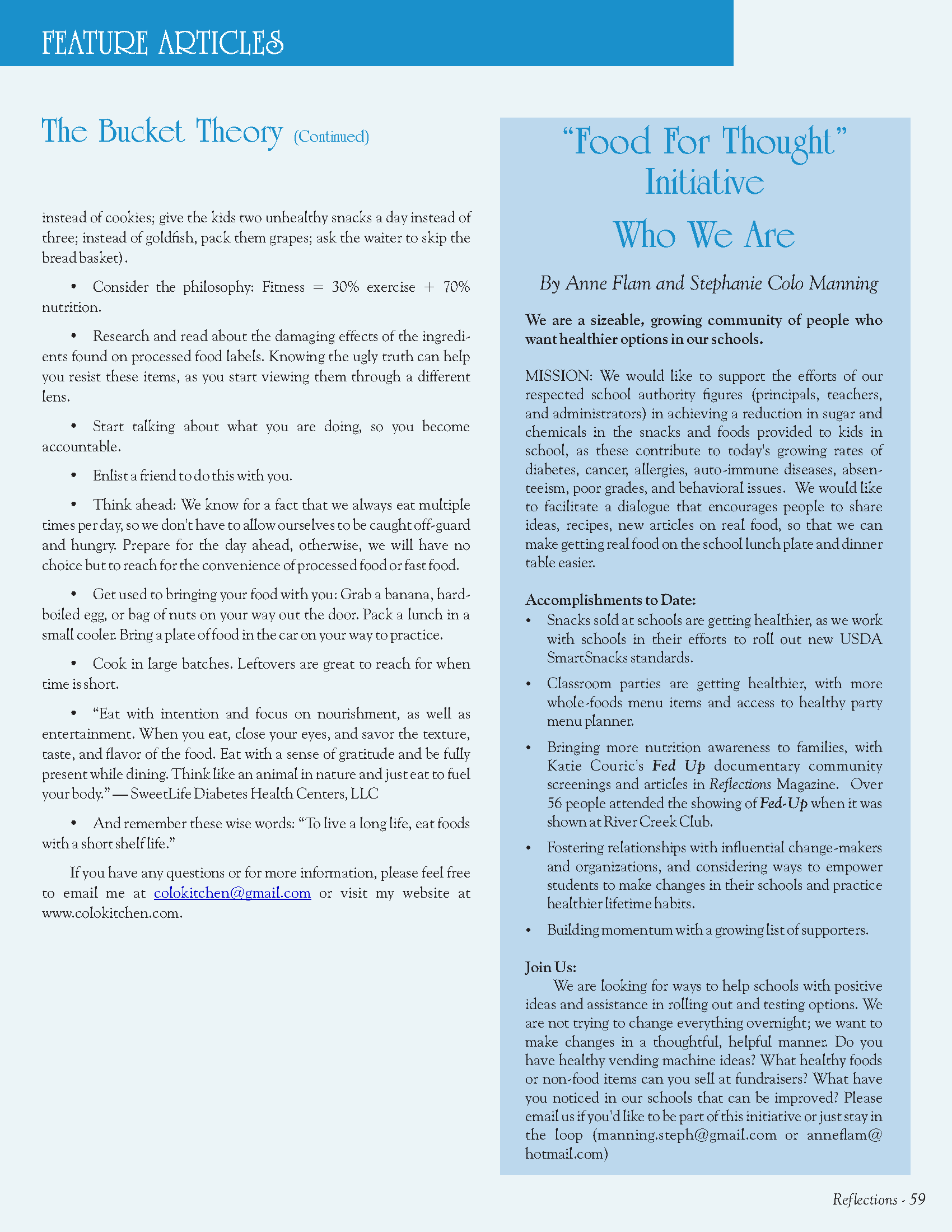By Stephanie Colo Manning
Luciano Pavarotti once said, “One of the very nicest things about life is that we must regularly stop whatever it is we are doing and devote our attention to eating.” What a wonderful way to think about something that has such a huge impact on our lives.
We can draw inspiration from this lovely statement as we think about our wellness in terms of a bucket that we must carry around. Imagine that our lifestyle affects the level of our bucket and we don’t want our bucket to get too heavy or overflow. We try to eat right, exercise, breathe deeply, rest, laugh, love, have fun, and think positively—all these actions help reduce the level in our bucket. On the other hand, exposures to certain foods, chemicals, allergens, pesticides, stress, lack of sleep, ticks, flu viruses – these types of quiet instigators add burden to our bucket.
Suddenly we may feel our bucket level rising, as we notice that something we’ve always felt fine with begins to bother us (e.g., a certain food, pollen, or soap), and symptoms seem to appear out of nowhere (e.g., acid reflux, headaches, or a skin rash.) These are often indicators of our bucket level rising. We can’t possibly know where the invisible overflow line is, but since our health is determined largely by a multitude of seemingly unimportant exposures everyday, we may be prompted to take a closer look at “unimportant.”
The body is designed for self-healing and it works hard to manage the bucket. Our cells are constantly being regenerated and replaced, and our new cells are built from whatever raw materials are currently available. It stands to reason that if we try our best to reduce our exposures to instigators and supply ourselves with the right tools (plenty of nutrient-dense foods and positive experiences,) then we can improve our health a little bit every day to prevent our bucket from overflowing.
Food, of course, is an incredibly important part of the equation. When it comes to our food, nutrient-density is not just good for us, but absolutely essential to proper biochemical functioning. Whole foods that are close to their original, natural form are extremely rich in vitamins, minerals, fiber, protein, essential fatty acids, enzymes and antioxidants – all vital building blocks for brain, cell, muscle, and nerve health. Whole foods provide exceedingly more nutrients than processed or refined foods, and come to the party with everything needed for their own metabolism. In fact, the complex combination of nutrients in a given whole food actually work together synergistically, the sum greater than the parts, producing a much more powerful effect on health than individual nutrients alone. That’s why taking vitamins can’t substitute for the real thing.
I used to think that eating empty calories was a net-neutral, nothing more than a missed opportunity to eat healthy. What I didn’t realize was that eating processed or refined foods actually burden the body, depleting its existing nutrient supply, resulting in a net-negative. A food’s natural nutrients and synergy are lost when it gets processed or refined, and a food with little or no nutrients to offer is like coming to the party empty-handed and drinking all the beer. It must steal the body’s existing nutrients in order to metabolize, drawing nutrients first from the bloodstream, then from the tissues, the organs and the muscles, and finally, from the bones. The body must dive deeper and deeper into its stores in order to metabolize nutrient-lacking foods. Add to this scenario the chemicals, additives, and preservatives typically found in processed or refined foods (which are completely foreign to the human body) and we are doing double damage.
Transitioning to an 85/15 way of eating can provide the nutrient-density needed to help manage our bucket. If we eat nourishing foods 85% of the time, then the body’s nutrient reserves will be rich and able to handle the nutrient depleting foods the other 15% of the time.
With hectic lifestyles, 85/15 can seem like a long shot, but here are some ideas which can help:
- Start talking about what you are doing and enlist a friend to join you.
- Consider the philosophy: Fitness = 30% Exercise + 70% Nutrition.
- Remind yourself about the vast differences in food quality. While each person’s dietary needs are individual, nourishing foods are generally those close to their original, natural form. Depleting foods would include most processed or refined foods containing sugar, white flour, additives, preservatives, colorings, flavorings, and unhealthy oils, and of course, food allergens, chemicals, and hidden instigators related to modern agricultural practices.
- Set realistic goals. Move up gradually from 30/70 to 40/60, etc. You can’t go from zero to hero overnight.
- Don’t completely eliminate the things that mean most to you right away, otherwise you risk being controlled by the impulse to binge.
- Gradually squeeze out depleting foods while squeezing in nourishing foods. Start with the easier ones – when the Nutri-Grain® bars are gone, replace with nuts and raisins; have an egg instead of cereal; a burger without the bun; crunchy roasted broccoli instead of french fries. Gradually up the ante – fresh apples rather than cookies; juicy grapes instead of Goldfish®; skip the bread basket; replace empty chip bags with some really nice cheeses.
- Google label ingredients. Knowing the ugly truth helps you resist processed foods when you view them through a different lens (who knew yeast extract and hydrolyzed protein are actually MSG in disguise?!)
- Look carefully at what is presumed healthy: Dannon low-fat vanilla yogurt contains as much sugar as two Twinkies®, and Bisquick® contains trans-fats, GMOs, refined flour, and sugar.
- Prepare for hunger. Try to prevent being caught off-guard. Eat before leaving the house; grab a banana, hard-boiled egg, or cheese on your way out the door; bring a small plate of food in the car; keep plenty of healthy staple foods in clear view.
- Take advantage of 5 minute time chunks. When the phone rings, put your earbuds in and prep the dinner salad while talking; clean and chop carrots while the kids eat breakfast; unwrap and season the chicken to be roasted tomorrow.
- Cook in large batches. Leftovers are often more delicious the second time around, and convenient when time is short.
- Be protective of your time. Say “no” or consider lowering the priority of certain obligations. Schedule in more cooking time.
- Cook together with your family.
- Feed the kids a super early dinner right after school (when they’re famished.) Then, after practice, all they’ll need is a banana or leftovers.
- Shoot for simple dishes with easy clean up, like grilled foods and one pot dinners. Gourmet is not the goal.
I recently came across this wise and simple advice: “To live a long life, eat foods with a short shelf life.” That about sums it up. Here’s to long life, one bite at a time!
If you have any questions or for more information, please feel free to email me at ColoKitchen@gmail.com or visit my website at www.clookitchen.com.


